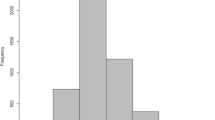Abstract
Computational humor detection systems rarely model the subjectivity of humor responses, or consider alternative reactions to humor - namely offense. We analyzed a large dataset of humor and offense ratings by male and female annotators of different age groups. We find that women link these two concepts more strongly than men, and they tend to give lower humor ratings and higher offense scores. We also find that the correlation between humor and offense increases with age. Although there were no gender or age differences in humor detection, women and older annotators signalled that they did not understand joke texts more often than men. We discuss implications for computational humor detection and downstream tasks.
Access this chapter
Tax calculation will be finalised at checkout
Purchases are for personal use only
Similar content being viewed by others
References
Basile, V., et al.: SemEval-2019 task 5: multilingual detection of hate speech against immigrants and women in twitter. In: Proceedings of the 13th International Workshop on Semantic Evaluation, pp. 54–63 (2019)
Bell, N.D.: Responses to incomprehensible humor. J. Pragmat. 57, 176–189 (2013)
Bischetti, L., Canal, P., Bambini, V.: Funny but aversive: a large-scale survey of the emotional response to Covid-19 humor in the Italian population during the lockdown. Lingua 249, 102963 (2021)
Castro, S., Chiruzzo, L., Rosá, A.: Overview of the HAHA task: humor analysis based on human annotation at IberEval 2018. In: IberEval@ SEPLN, pp. 187–194 (2018)
Chiruzzo, L., Castro, S., Etcheverry, M., Garat, D., Prada, J.J., Rosá, A.: Overview of haha at IberEval 2019: humor analysis based on human annotation. In: IberLEF@ SEPLN (2019)
Excell, E., Moubayed, N.A.: Towards equal gender representation in the annotations of toxic language detection. In: Proceedings of the 3rd Workshop on Gender Bias in Natural Language Processing, pp. 55–65 (2021)
Ferstl, E.C., Israel, L., Putzar, L.: Humor facilitates text comprehension: evidence from eye movements. Discourse Process. 54(4), 259–284 (2017)
Friedman, M.: The use of ranks to avoid the assumption of normality implicit in the analysis of variance. J. Am. Stat. Assoc. 32(200), 675–701 (1937)
Haidt, J., Lukianoff, G.: The coddling of the American mind: how good intentions and bad ideas are setting up a generation for failure. Penguin UK (2018)
Hofmann, J., Platt, T., Lau, C., Torres-Marín, J.: Gender differences in humor-related traits, humor appreciation, production, comprehension, (neural) responses, use, and correlates: a systematic review. Curr. Psychol. 1–14 (2020)
Hossain, N., Krumm, J., Gamon, M., Kautz, H.: SemEval-2020 task 7: assessing humor in edited news headlines. arXiv preprint arXiv:2008.00304 (2020)
Knegtmans, H., Van Dijk, W.W., Mooijman, M., Van Lier, N., Rintjema, S., Wassink, A.: The impact of social power on the evaluation of offensive jokes. Humor 31(1), 85–104 (2018)
Köhler, G., Ruch, W.: Sources of variance in current sense of humor inventories: how much substance, how much method variance? (1996)
Kuipers, G.: The humor divide: class, age and humor styles. In: Good Humor, Bad Taste, pp. 71–101. De Gruyter Mouton (2015)
Lockyer, S., Pickering, M.: Beyond a Joke: The Limits of Humour. Springer, London (2005). https://doi.org/10.1057/9780230236776
Meaney, J.: Crossing the line: where do demographic variables fit into humor detection? In: Proceedings of the 58th Annual Meeting of the Association for Computational Linguistics: Student Research Workshop, pp. 176–181 (2020)
Meaney, J., Wilson, S., Chiruzzo, L., Lopez, A., Magdy, W.: SemEval 2021 task 7: hahackathon, detecting and rating humor and offense. In: Proceedings of the 15th International Workshop on Semantic Evaluation (SemEval-2021), pp. 105–119 (2021)
Potash, P., Romanov, A., Rumshisky, A.: SemEval-2017 task 6:# hashtagwars: learning a sense of humor. In: Proceedings of the 11th International Workshop on Semantic Evaluation (SemEval-2017), pp. 49–57 (2017)
Prabhakaran, V., Davani, A.M., Diaz, M.: On releasing annotator-level labels and information in datasets. In: Proceedings of the Joint 15th Linguistic Annotation Workshop (LAW) and 3rd Designing Meaning Representations (DMR) Workshop, pp. 133–138 (2021)
Proyer, R.T., Ruch, W.: Enjoying and fearing laughter: personality characteristics of gelotophobes, gelotophiles, and katagelasticists. Psychol. Test Assess. Model. 52(2), 148–160 (2010)
Ruch, W.: The Sense of Humor: Explorations of a Personality Characteristic, vol. 3. Walter de Gruyter, Berlin (2010)
Silva, L., Mondal, M., Correa, D., Benevenuto, F., Weber, I.: Analyzing the targets of hate in online social media. In: Proceedings of the International AAAI Conference on Web and Social Media, vol. 10 (2016)
Spearman, C.: The proof and measurement of association between two things. Am. J. Psychol. 15(1), 72–101 (1904)
Svebak, S., Martin, R.A., Holmen, J.: The prevalence of sense of humor in a large, unselected county population in Norway: relations with age, sex, and some health indicators (2004)
Vallat, R.: Pingouin: statistics in python. J. Open Source Softw. 3(31), 1026 (2018)
Wilcoxon, F.: Individual comparisons by ranking methods. In: Biometrics Bulletin, no. 6, vol. 1, pp. 80–83 (1945). http://www.jstor.org/stable/3001968
Zampieri, M., et al.: SemEval-2020 task 12: multilingual offensive language identification in social media (OffensEval 2020). arXiv preprint arXiv:2006.07235 (2020)
Acknowledgements
This work was supported in part by the EPSRC Centre for Doctoral Training in Data Science, funded by the UK Engineering and Physical Sciences Research Council (grant EP/L016427/1) and the University of Edinburgh.
Author information
Authors and Affiliations
Corresponding author
Editor information
Editors and Affiliations
Rights and permissions
Copyright information
© 2022 The Author(s), under exclusive license to Springer Nature Switzerland AG
About this paper
Cite this paper
Meaney, J.A., Wilson, S.R., Chiruzzo, L., Magdy, W. (2022). Don’t Take It Personally: Analyzing Gender and Age Differences in Ratings of Online Humor. In: Hopfgartner, F., Jaidka, K., Mayr, P., Jose, J., Breitsohl, J. (eds) Social Informatics. SocInfo 2022. Lecture Notes in Computer Science, vol 13618. Springer, Cham. https://doi.org/10.1007/978-3-031-19097-1_2
Download citation
DOI: https://doi.org/10.1007/978-3-031-19097-1_2
Published:
Publisher Name: Springer, Cham
Print ISBN: 978-3-031-19096-4
Online ISBN: 978-3-031-19097-1
eBook Packages: Computer ScienceComputer Science (R0)




